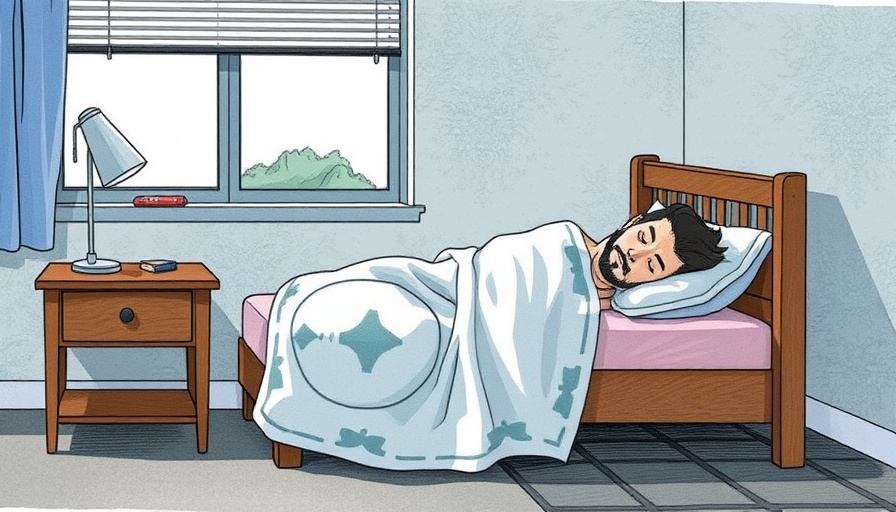
A Journey Through the Sleepless Nights
Imagine battling chronic insomnia for decades, only to be dismissed by countless doctors. This has been the reality for many individuals who experience sleep deprivation—a life-threatening condition often intertwined with physical issues that go unnoticed. The story of one woman serves as a potent testament to the struggles faced by insomniacs, illustrating how deeply entrenched this issue can be in the narratives of those who suffer from it.
Understanding Chronic Insomnia
Chronic insomnia is more than just an inconvenience; it's a debilitating condition affecting mental health and overall vitality. Reports indicate that nearly one in four adults in America struggle with insufficient sleep, and this figure climbs even higher among individuals dealing with stressors such as work pressure and health issues. Unlike common misconceptions that liken insomnia to mere difficulty relaxing, this condition can be a significant barrier to leading a fulfilling life.
The Misunderstood Insomniac: A Personal Account
For nearly 40 years, the protagonist of our story was told repeatedly that her insomnia was simply in her head. She faced a barrage of unsolicited advice, ranging from relaxation techniques to the antiquated notion that women are just prone to being "high-strung." This narrative reveals how society often minimizes the impact of insomnia, positioning sufferers as 'difficult' rather than acknowledging the serious health implications of poor sleep.
Breakthrough Moments: Finding the Right Doctor
After enduring a long history of dismissals, she finally found a doctor willing to listen. This encounter exemplifies the importance of advocating for oneself in healthcare settings. When a healthcare professional validates the physical roots of chronic insomnia, it can pave the way for more effective treatment options—far beyond simple lifestyle changes. This insight encourages readers to seek out health and wellness centers that specialize in sleep disorders.
Physical and Mental Health: An Interlinked Narrative
What many fail to realize is that sleep has an undeniable link to mental health. The National Sleep Foundation highlights that poor sleep can exacerbate mental health conditions such as depression and anxiety—creating a vicious circle where lack of sleep leads to worse mental health, which in turn contributes to ongoing sleeplessness. Awareness of this relationship is critical for individuals seeking holistic health and wellness.
The Broader Conversation: Community Health and Wellness Initiatives
The discussion surrounding insomnia and its health implications extends beyond the individual level. Community health initiatives in cities, such as San Antonio, are increasingly focused on shedding light on sleep hygiene, offering resources that can help mitigate issues related to insomnia. Events focusing on health and wellness are essential to education; they foster environments where individuals can learn about natural therapies, such as aromatherapy or herbal supplements, to promote better sleep.
Challenging Myths: Changing the Dialogue
The stigmas attached to insomnia underscore a broader societal challenge regarding mental health. Dispelling myths about insomnia and educating the public can initiate crucial conversations about sleep, stress management, and alternative therapies like naturopathy. By embracing a more nuanced understanding of wellness—one that incorporates mental, physical, and emotional health—we can create a more supportive environment for those who suffer from insomnia.
Taking Action: Steps Towards Better Sleep
For those struggling with sleep disorders, it is vital to take proactive steps. Establishing a dedicated sleep routine, exploring nutritional supplements, and seeking specialized healthcare can enhance your chances of reclaiming restful nights. It's also essential for communities to promote health and wellness features, as they can be fundamental for individuals searching for guidance on how to naturalize their sleep patterns.
In a world where sleep deprivation is often overlooked, recognizing insomnia as a serious condition is crucial. If you or someone you know is dealing with chronic sleep issues, consider seeking out the right resources that truly understand the complexities of insomnia.
In closing, if you've ever felt dismissed or unheard when discussing sleep troubles, remember that there’s hope. Take the steps necessary to prioritize your health and wellness. Join local health events that promote discussions around insomnia, and consider exploring available treatments that appeal to both conventional and alternative medicine. Your journey to restorative sleep may start with the right conversation.
 Add Row
Add Row  Add
Add 




 Add Row
Add Row  Add
Add 


Write A Comment